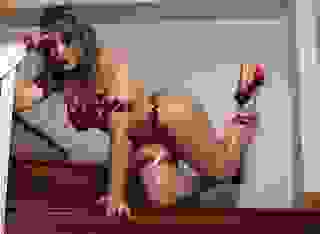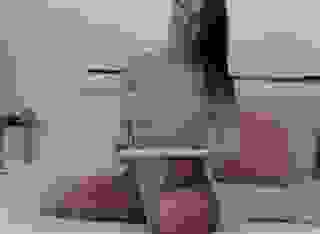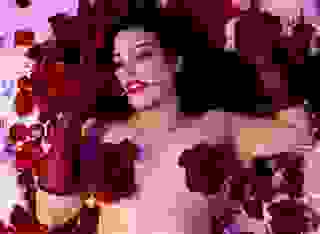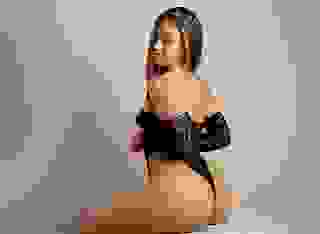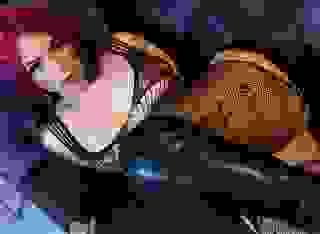Note: You can change font size, font face, and turn on dark mode by clicking the "A" icon tab in the Story Info Box.
You can temporarily switch back to a Classic Literotica® experience during our ongoing public Beta testing. Please consider leaving feedback on issues you experience or suggest improvements.
Click here"Of course I have questions," I said. "Who are you? Where did you come from? Why are you here?"
"As for who I am, I have already told you. I'm Barbara. Where I came from is not important. And I am here because someone thought you might benefit from my company in the days ahead. You might call me an emissary."
"Emissary? Whose emissary?" But it dawned on me as I asked the question whose emissary Barbara probably was.
Barbara regarded me with mild amusement. "I can see by your face that you've already surmised the answer," she said.
My voice dropped to a whisper. "The God of --"
"I suggest that you not utter that phrase at the moment," Barbara warned, glancing towards my cubicle entrance. I followed her glance.
Just then, Harold appeared, walking by carrying an armload of file folders. "Hey Andrew," he called when I caught his eye. Then he did a double take, stopping in his tracks to stare at my desk. "What's with the dog?" he asked, bemused.
Harold stood waiting for an answer. I tried to play it off casual. "Oh, this?" I said, gesturing with my head towards the dog where she sat at the edge of my desk. "I found her on the way in today. Cute, isn't she?" All of which was true enough. Barbara, meanwhile, twisted around and began rooting in her nether regions in an almost self-consciously doglike fashion.
Harold stared at Barbara for a few seconds, then pulled his eyes back to me. "Yeah, cute," he said absently. He shook his head as if to clear it, then asked, "Hey, are we still on for lunch?"
"Probably not," I said ruefully. "Carver's got me on fish detail." I pointed my finger skywards.
Harold nodded and gave me a half smile. "Well, you sure called that one. Alright. Well, I guess I'll see you later." He wandered off. I watched him retreat down the rows of cubes until he was out of sight.
I glanced at Barbara, who had stopped her rooting. I could see her hackles ever so slightly raised. I felt a shiver go down my spine as if in sympathy. "What's the matter?" I asked.
Barbara turned to me. "That one troubles me," she replied quietly. "Although I cannot tell you why."
"Can't, or won't?"
"Can't. I advise caution in your dealings with him. But that is of small import at the moment. We have further matters to discuss, and I would prefer we choose a more discreet setting for our talk. Suggestions?"
I thought a moment. "Well, there're the isolation booths on floor 16," I said.
Barbara nodded in satisfaction. "That will be quite sufficient. Go now. I will meet you there."
I got up and put my desk in some semblance of order. Floor 16 was two floors up, and I planned on leaving the office from there in order to get started on my assignment. I left my cube, leaving Barbara sitting calmly on my desk.
The isolation booths were one of the many curious features of the Complex. They were simply small rooms, about five feet on a side, with motorized sliding pocket doors. The rooms were light beige inside and out, and furnished with two chairs and a small table. They were soundproof and surveillance-proof, and they were designed for self time or small meetings that needed to be private.
When I got to the booths, all three were occupied. I sat down to wait on one of the benches that lined the wall opposite the booths. I was in luck, for one of the booth doors slid open after only a few minutes. Two women walked out. I waited for them to be a respectable distance away before getting up, crossing the hall, and entering the now vacant booth.
At least, I had assumed it to be vacant. When I popped my head in, I saw Barbara sitting on the table. It gave me a start.
I pushed the button on the wall and waited for the door to slide closed. When it had, I sat down in one of the chairs. "How'd you get in here?" I asked. Teleportation into and out of an isolation booth was not possible, even if the door was open.
Barbara seemed pleased with herself, but refused to reveal how she had eluded me. "My methods of going from point A to point B are not available to your scrutiny," she explained.
"So, are you going to be popping in and out wherever I go?" I said with a smirk.
"I will do that which I deem necessary," Barbara replied stiffly.
"I'm sorry," I said, "I was only teasing." Barbara nodded her acknowledgement. I continued. "So you're working for the God of Toast?"
"I serve him," replied Barbara. "I have been sent to offer you assistance in your task of removing the fish from the sky."
"Why does the God of Toast care about that?"
"He did not tell me why," said Barbara, "and I hesitate to speculate. I know only that the matter of the fish in the sky is of some importance to him. As are you."
I became perplexed. "If I'm so important to him, why can't I remember anything about him?"
It was Barbara's turn to be perplexed. I briefly explained what had happened in the One True Toaster Factory and how my memory of my time with the God of Toast had been erased. When I had finished, Barbara shook her head. "This information worries me," she said. "To my knowledge, nothing like what you describe has happened before."
We sat a moment in sober silence. Then I said, "So what happens now?"
"You have much work to do," said Barbara. "Now that we have become acquainted, I think it would be best if I left you to get started as you see fit."
"When will I see you again?" I asked.
"Soon enough."
"Are you always going to be cryptic like this?" I said, mildly exasperated.
"No," she replied.
I bade farewell to Barbara, left the isolation booth, and began making my way to the surface. I was filled with purpose and steady resolve, eager to tackle my mission. The oblique connection to the God of Toast made the fish in the sky all the more intriguing. More than anything, I wanted to be out of the Complex and facing the challenges I knew lay ahead.
Unfortunately, I was 16 floors underground, and the elevator system of the Complex did not lend itself to directness. Most of the elevators only ran between two floors, and the different elevators were sometimes several minutes walk from one another. So if, for example, I wanted to get from floor 16 to floor 15 (which I did), I would need to go to the 15-16 elevator in the southwest corner of floor 16. Then, to get to floor 14, I would have to use the 14-15 elevator in the northwest corner of floor 15. And so on and so forth. There were some other idiosyncrasies as well. For example, on floor 13, in addition to the 12-13 and 13-14 elevators, there was an elevator that went directly to floor 19 with no stops in between. We called it the 13-19 express. And there were all sorts of these idiosyncrasies. Navigating the Complex was a skill that took years to master.
In any event, I was on my way to the surface, decidedly not as the crow flies. It was therefore not terribly surprising that in the forced roundaboutness I should run into Carver. It was on floor 7. He emerged from a side hallway as I was passing it and fell into step beside me almost as if he had expected me to be there.
"Andrew," he said in greeting.
"Carver," I replied.
"On your way to 6?"
"Yes."
"Me too."
We walked on in silence until we got to the 6-7 elevator.
"Going up?" Carver asked, before pressing the only button available. Elevator jokes were common in the Complex. I smiled politely, as one did.
After a few seconds, the elevator chimed and the doors slid open. Carver gestured for me to enter, so I did; he followed. When the doors slid shut, he said, "So, on your way up and out to deal with those fish?"
"Nah," I replied, "I figured I'd just wander around here for a while, then maybe go get some sandwiches."
Carver bristled but said nothing. This was how it was between Carver and me. The elevator came to a smooth stop and the doors slid open. Carver stalked out. At that moment, I remembered Barbara's advice. Following it wouldn't hurt anything. Vacating the elevator, I called out Carver's name.
He stopped and turned back to me. I caught up to where he was standing. "Listen," I said in a conciliatory tone, "I'm sorry about that wisecrack back there. I'm a little stressed is all. Of course I'm on my way to deal with the fish, and I won't let you down."
Carver was visibly surprised and pleased at my apology. "Golden frogs fashion straw mats upon which to dry their garden lanterns," he said.
I blinked. This was not what I had expected to hear. In fact, it wasn't even close. Carver seemed to be waiting for a response, though. I decided to play along. "Throat massage is a new and exciting industry offering many opportunities for the enterprising truffle pig," I said.
Carver seemed satisfied. Clapping me on the shoulder, he said, "Knock 'em dead, kid."
"Those fish won't know what hit 'em," I replied.
Carver walked away. After a few moments, so did I. In a different direction.
It was about an hour later that I reached the surface. I climbed out of the hole and found myself standing in the light of the noonday sun. It wasn't direct sunlight, mind you; the sun was evidenced only by a bright spot in the canopy of fish that covered the sky.
It was this and only this time of day that sunlight falls across the entrance hole of the Complex. The hole lies in a very narrow alley between two tall buildings, behind a perpetually smelly dumpster and a dead dog in a state of eternal decay.
When new people ask why the entrance to the Complex is in such cruddy environs, the answer is usually something along the lines of, "It's tradition." I'm guessing that's not really the brush-off answer that it might at first seem to be. My theory is that at one time, the dumpster and the dog were the only means of discouraging unwanted investigations by local citizenry. These days, there's a full hologrammatic projection of a brick wall across the entrance to the alley, along with subsonic hypnotic suggestions for people to stay away. As such, the garbage and canine corpse seem superfluous. Tradition, I think, is the only plausible explanation for their continued presence.
I went to the mouth of the alleyway and strolled through the hologram. I used to worry about leaving the alley the moment when someone was watching, thereby giving away the secret. But that fear wore off fairly quickly. In the history of the Complex, only two outsiders have ever entered uninvited. Both were ultimately offered jobs in the Complex, and they both took those jobs. If you're curious, I was one of those two people, and Harold was the other.
Once in the street, I made my way to the nearest business that sold newspapers. There was a coffee shop nearby, and I went in and bought the city's paper and a national paper. My goal was to collect data and to get the public perception of the phenomenon.
As far as the latter was concerned, I wasn't particularly worried. To all appearances, people were just getting on with their day. Certainly there was more sky-gazing than usual, but the fish in the sky didn't seem to be getting in the way of capitalism. Businesses were open, people were going to work, the airlines were running, and there was no widespread panic or anything of that nature going on.
I sat down with my newspapers and some iced black coffee. On the national paper, there was a full-color photo, rather nicely shot, of the fish-filled sky over the Rocky Mountains. "Something Fishy," said the headline. I skipped that article and moved on to the city paper, which had a good reputation. There was a news item about the fish on the front page, but it was below the fold. This surprised me a little. "Experts Mystified by Fish in Sky," read the headline. I began reading.
I hadn't gotten far when a man came into the coffee shop. He was a gruff-looking man, and he was wearing a wimple.
I certainly recognized the man in the wimple, and I could tell he recognized me by the way he did a double-take when he saw me. We stared at each other warily for a second or two. Then, deliberately making sure he noticed, I removed my right pinky finger and set it on the table in front of me, pointing to the ceiling.
The man backed away a step with his hands raised, rightly recognizing my threat. Then he turned and went to the counter. I heard him order an iced chai. Drink in hand, he slowly approached my table, his other hand in full view at all times.
"May I join you?" he asked.
After some consideration, I replied with mock cordiality, "Oh yes, please do have a seat."
He sat down, carefully, eyeing my right pinky finger. Setting down his drink, he folded his hands and set them on the table in front of him. In his wimple, the position could almost have been worshipful. "I assure you, there's no need for that," he said, indicating my finger. "I have no intention of threatening you in any way at this time, and it would ease my mind if we could converse like civilized business men."
Again, I considered. It was true that he had made no threatening move, we were in a somewhat busy coffee shop, and I could always reopen my digital cavity should the need arise. I picked up my finger and put it back on my hand. My companion relaxed visibly.
"I appreciate it," he said. He paused to take a sip from his drink. "My name is Binks," he continued. "Roger Binks. And you are Andrew Millik."
I raised an eyebrow.
"The reason I know your name is because I was hired to kill you. I'm an independent contractor in the same field you work in."
"I don't kill people," I retorted.
Binks shrugged. "I don't either, typically. This was supposed to be a sort of test job with my client. If I did well, the understanding was I would get regular work more in line with my areas of expertise. A gateway job, if you will."
"And?"
"Well, I hope you understand that a person can take a job without fully understanding the ramifications. Particularly a person in financial difficulties."
"So you want money from me?" I said.
Binks became irritated. "Shut up and listen," he snapped. "I was hired to kill you before this business went down." He gestured vaguely at the sky. "I took the job without understanding what your role would be in said business.
"When a man wants out of his contract, he should be able to get out of it. But there was no exit clause. So if I should choose to do you in with a dismantler drone, and if there should be a DDA agent in the vicinity, well, what can I do about it? I tagged you, and in my book that fulfills my contract. Thank you and have a nice day."
He paused to regard me. "Am I being understood?" he asked.
I kept my face expressionless, but nodded once, slowly.
"Good," said Binks. He produced a business card from somewhere. I didn't see him reach for a pocket; it seemed simply to appear in his hand. He set it on the table in front of me. "This is my card," he said. "I'm making myself available to you in your task. Pro-bono. And that's nothing to sniff at; my abilities and resources are substantial. Should you need anything, simply lick the card and I'll be around."
"Where's the card been?" I asked sarcastically.
Binks snorted. "I assure you it's non-toxic, antibacterial and antiviral." He stood up. "There are trying times ahead, Millik. Even a mercenary like me has to choose sides. I choose to be on your side. Be seeing you." He turned to leave.
"There's just one question," I said. Checking his departure, he turned back to me. "What's with the wimple?"
Binks smiled a half smile. "What's with the duck shoes?" he countered. Then he was gone.
I looked down at the card on the table. I picked it up and put it in my right pinky finger. Despite my misgivings, I recognized that Binks had the potential to be useful.
That was twice today that someone powerful had warned me of the future and put themselves at my disposal. I was beginning to worry.
I left the coffee shop shortly after Binks did. Unsure of what I wanted to do next, I decided to go home, if for no other reason than to get some sensible shoes.
When I got home, I had a bit of a shock. I discovered that the house was completely gone, and the entire lot was occupied by a nicely landscaped pond. Although man-made, the pond was not freshly installed, if the plant life and the age of the wood chips that were spread over the beds were any indication. This pond had been here for quite some time. Exactly how that could be, I didn't know. I double-checked that I had the address right, and I did. My house had been replaced by a pond.
My initial concerns were for the beloved quartet of Matilda, Heather, Sara, and Gertrude. I had no way to know where they were or if they were safe. My secondary concern was for my shoes. I would be stuck with duck feet for at least a little while longer.
In the front corner of the lot, there was a park bench that faced the pond. I sat down, intending to calm myself so that I could begin to apply my intelligence to the problems before me. The fish in the sky were reflected in the pond's still waters and seemed almost to mock me. I became convinced that my house's disappearance had something to do with those wretched fish.
I had been sitting there, thoughts churning, for about two minutes when Barbara crawled from beneath the bench and hopped up beside me.
"Hi, Barbara," I said. She deigned to let me scratch her behind the ears. "Got any advice for me? I'm in bad shape here."
"I'm afraid I don't have much help for you," said Barbara with a sigh. "It is quite possible that your home can never be restored. Unfortunately, the only thing I can tell you for certain is that your female companion is safe."
On hearing the news that the beloved quartet was safe, the vise that had been squeezing my entrails for the past few minutes evaporated. The sudden change in pressure made me laugh. Barbara regarded me quizzically. "They're okay," I said. "That's the most important news you could have possibly told me."
Barbara shrugged. "If you say so."
"So where are they?" I asked.
"That, I don't know. I only know that she is currently safe and in no imminent danger. Her whereabouts are hidden from me."
"Oh. Well, that makes the news not quite as good."
We sat looking at the pond for a while. After a time, Barbara said, "What are you going to do?"
I sighed. "Well, my first instinct is to see after Matilda, Heather, Sara, and Gertrude. However, I have a feeling that the more selfless and noble course of action would be to move forward with the fish business."
"Which will you choose?"
"I have a strong hunch that the two choices are interconnected. So if I focus my efforts on retrieving my loved ones, I will also be making progress on the fish front. Hopefully."
"So you will follow your own selfish ends and leave the world to its fate?"
I looked at Barbara. "I don't see it that way," I said. "Fix a small piece of the world, and the whole is improved, however slightly."
Barbara gave a nod of approval. Then she said, "You still have a mailbox."
I glanced to the other front corner of the lot. Sure enough, the old mailbox was still there, the only element of my house that remained. "Well, I guess I'd better get the mail," I said, standing.
"I'll leave you to it," said Barbara. She hopped down from the bench. "We'll meet again soon." She trotted daintily into the bushes and disappeared from view.
The mail contained an offer for a platinum card from a credit card company, a wholesale pond care supply catalog (a nice touch, I thought), and one of those gaudy, busily-printed sweepstakes envelopes. I glanced through to make sure I hadn't missed anything; I hadn't. Then the sweepstakes envelope caught my eye.
"Don't throw this envelope away, Andrew Millik!" the envelope shouted in cheerfully urgent orange letters. My name was printed in a white oval in a more businesslike font. Below the big orange letters, in a slightly smaller black font, it said, "Follow the enclosed instructions if you ever want to see Gail Millik and your house again!" The words "Gail Millik and your house" were printed in a similar white oval in the same font as my name. Gail Millik is my wife's mundane name.


